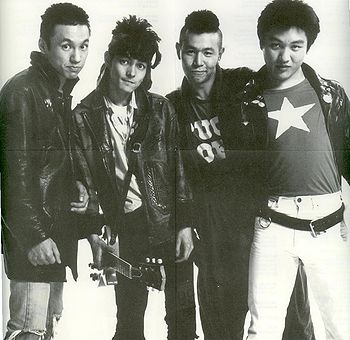Update @ July 7, 2025: If you are having issues with the site (including any PHP errors), please contact us via Facebook. Thank you!
THE BLUE HEARTS: Difference between revisions
From generasia
mNo edit summary |
mNo edit summary |
||
| Line 47: | Line 47: | ||
* [1993.02.25] [[Tabibito / Typhoon]] (旅人 / 台風; ''Traveller / Typhoon'') | * [1993.02.25] [[Tabibito / Typhoon]] (旅人 / 台風; ''Traveller / Typhoon'') | ||
* [1993.05.25] [[1000 no Violin]] (1000のバイオリン; ''1000 Violins'') | * [1993.05.25] [[1000 no Violin]] (1000のバイオリン; ''1000 Violins'') | ||
* [1993.08.25] [[Party]] (パーティー) | * [1993.08.25] [[Party (THE BLUE HEARTS)|Party]] (パーティー) | ||
* [1993.10.25] [[Yuugure]] (夕暮れ; ''Evening'') | * [1993.10.25] [[Yuugure]] (夕暮れ; ''Evening'') | ||
Revision as of 19:41, 20 March 2012

THE BLUE HEARTS (ザ・ブルーハーツ) was a popular Japanese punk rock band. They are known for hits such as Jounetsu no Bara, TRAIN-TRAIN and Linda Linda.
Members
- Koumoto Hiroto (甲本ヒロト) (Vocals / Blues Harp)
- Mashima Masatoshi (真島昌利) (Guitar)
- Kawaguchi Junnosuke (河口純之助) (Bass)
- Kajiwara Tetsuya (梶原徹也) (Drums)
Information
THE BLUE HEARTS first debuted in May of 1987, and would later break up in 1995. Koumoto Hiroto and Mashima Masatoshi would later form the bands THE HIGH-LOWS and then THE CRO-MAGNONS. Their song TRAIN-TRAIN is a popular karaoke song even to this day. Another song of the band's, Linda Linda, saw a revival in recent years. It was used in the game Ouendan, in the dorama Sekai no Chuushin de, Ai wo Sakebu and in the film Linda Linda Linda.
Discography
Albums
- [1987.05.21] THE BLUE HEARTS
- [1987.11.21] YOUNG AND PRETTY
- [1988.11.23] TRAIN-TRAIN
- [1990.09.10] BUST WASTE HIP
- [1991.12.21] HIGH KICKS
- [1993.02.10] STICK OUT
- [1993.07.10] DUG OUT
- [1995.07.10] PAN
Other Albums
- [1995.01.01] MEET THE BLUE HEARTS (Best Album)
- [1995.09.25] EAST WEST STORY (Best Album)
- [1995.10.16] SUPER BEST (Best Album)
- [1996.01.01] LIVE ALL SOLD OUT (Live Album)
- [1997.11.25] Nooto Live on '94 6.18/19 (野音) (Live Album)
- [1999.11.25] Singles 1990-1993 (Best Album)
Singles
- [1987.02.25] Hito ni Yasashiku (人にやさしく; Be Nice to People)
- [1987.05.01] Linda Linda (リンダ リンダ)
- [1987.11.21] Kiss Shite Hoshii (キスしてほしい; I Want to Kiss You)
- [1988.07.01] Chernobyl (チェルノブイリ)
- [1988.07.01] Blue Hearts no Theme (ブルーハーツのテーマ; The Blue Hearts' Theme)
- [1988.11.23] TRAIN-TRAIN
- [1989.02.21] Love Letter (ラブレター)
- [1989.06.21] Aozora (青空; Blue Sky)
- [1990.07.25] Jounetsu no Bara (情熱の薔薇; Rose of Passion)
- [1991.04.10] Kubitsuri Dai Kara (首つり台から; Down from the Hanging Block)
- [1991.11.28] Ano Musume ni Touch (あの娘にタッチ; I Touch That Woman)
- [1992.03.10] TOO MUCH PAIN
- [1992.10.25] Yume (夢; Dream)
- [1993.02.25] Tabibito / Typhoon (旅人 / 台風; Traveller / Typhoon)
- [1993.05.25] 1000 no Violin (1000のバイオリン; 1000 Violins)
- [1993.08.25] Party (パーティー)
- [1993.10.25] Yuugure (夕暮れ; Evening)